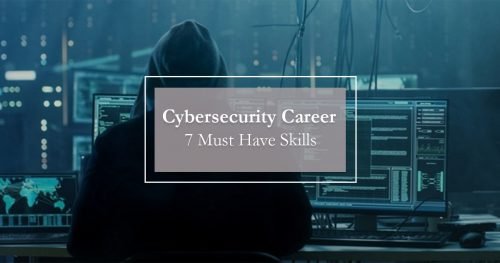7 Must Have Skills for a Successful Cybersecurity Career

If you’re considering a career in cybersecurity, this may be the perfect year to start!
And here’s why:
- In 2021, 55% of enterprise executives are expected to increase their cybersecurity budgets.
- Around 51% intend to add full-time cyber staff in their organizations.
- The unemployment rate in the cybersecurity industry is 0%.
But before you start applying, think about this: do you have required skills and competencies to make it successfully in this industry?
If you’re hesitating to answer, don’t worry. All you need to do is work on these aspects first using the following lines as your guide.
7 Skills Every Cybersecurity Professional – Must Have
If you’re serious about a career in cybersecurity, you need to have a few essential skills. In addition to impressing recruiters, these skills strengthen your resume and add to your confidence during interviews.
Here are seven skills you MUST possess:
1) Technical Know-How
While there are different disciplines within cybersecurity, many jobs share a common technical foundation.
For instance, all professionals need to have a good grasp on the architecture, administration, and management of operating systems, networking, etc. This knowledge helps them effectively use tools such as firewalls and network load balancers.
So make sure to gain sound technical knowledge on the particular cybersecurity discipline you plan to go for.
2) Problem-Solving Skills
Problems will rear their heads throughout your career. Since it’s your job to solve them, you need to develop your problem-solving skills.
You especially need to cultivate the following or strengthen them:
- Analytical skills
- Creative thinking
- Resilience
- Level-headedness
Doing sp will ensure that you can amicably handle technical issues and problems.
3) Threat Detection
93% of organizations believe threat hunting to be the top-most security initiative for the successful and early detection of risks.
Threat hunting entails searching through networks, endpoints, and datasets to detect malicious or suspicious activities that aren’t even picked by cybersecurity tools.
Possessing this skill will make you an important asset for your employer. After all, you’re helping them stay proactive while ensuring confidential data isn’t misused or accessed by unauthorized individuals.
4) Cloud Management
With the widespread adoption of cloud computing products and services in various industries, cloud management has now become an essential domain in IT service management. .
Security professionals with knowledge of cloud deployment comparatively have a higher demand in the market. The skills to integrate PaaS, SaaS, or IaaS with enterprise architecture are becoming essential for building a secure network within a cloud environment.
Having this skill will certainly give you a competitive advantage over other potential candidates.
5) Strong Interpersonal Skills
Regardless of your role in protecting the cybersecurity of your organization, you’ll be required to interact with decision makers and practitioners. You’ll especially be interacting often with C-suite members, board members, senior level executives and management level staff.
Therefore, you must have the capability and skill to communicate effectively – both verbally and in writing. That way, you can relay information properly and articulate complex concepts to teammates regardless of their technical know-how.
6) Agility
People with the ability to adapt fast are vital for today’s businesses. And with new threats to cybersecurity appearing, you need to be ready to think out of the box to resolve them.
Your flexibility will further make you an essential asset. Especially when your employer needs alternative strategies and plans for the continuity of secure business operations, even during turbulent times.
7) Business Acumen
As a cybersecurity expert, you need to be involved in different functions across the organization. Therefore, in addition to being a successful technologist, you should have a sound understanding of business.
This skill is especially vital while working with experts from a non-technical background. It allows you to bridge any gaps which could prevent decision makers from understanding some of your recommendations.
Complement Skills with Cybersecurity Certifications
If you really wish to prove your dedication to this career, complement your skills with a cybersecurity certification. Here are some of the best you can consider.
- Certified Information Security Manager (CISM) – This certification demonstrates your knowledge of Information Security Governance, Information Risk Management, Information Security Program Development & Management. It validates your knowledge on international information security practices and your ability to run successful security programs at your organization.
- Certified Information Systems Security Professional (CISSP) – CISSP certification proves your knowledge and skill on implementing the design, architecture, controls, and management of highly secure business environments. It also vouches for your cybersecurity knowledge, especially on domains such as Access Control, Cryptography, Telecommunications, and Networking.
- Certified Ethical Hacker (CEH) – As a Certified Ethical Hacker, your employer will be sure of your knowledge on hacking technologies targeting cloud computing technology, mobile platforms, and the latest operating systems. The certificate further validates your ability to assess latest vulnerabilities, malware and viruses within the network system.
We’re Here to Help You Become a Skilled Cybersecurity Expert
LearningCert can prepare you for the certification exams related to top security certifications. Simply enroll in one of our upcoming virtual-instructor training sessions to train with accredited trainers with years of practical experience.
You can also opt for self-paced training if you wish to study on your own. Our courses are designed to engage you from start to finish while helping you retain important information.
Want to train with colleagues? Talk to our Training Advisors about our corporate training options for more details.




